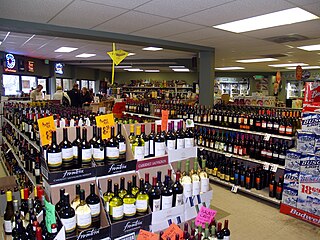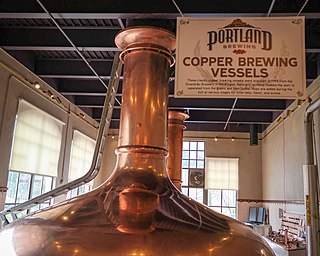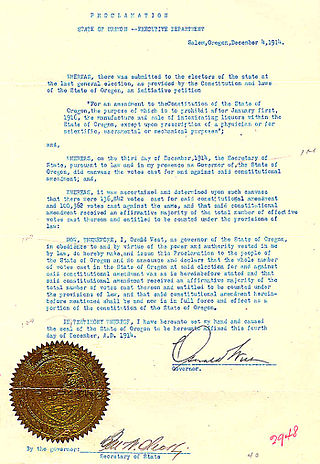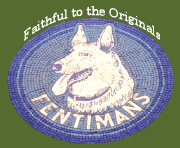Ice beer is a beer that has undergone some degree of freezing during production. These beers generally have a higher alcohol content, and lower price relative to it.

Low-alcohol beer is beer with little or no alcohol content and aims to reproduce the taste of beer while eliminating the inebriating effects of standard alcoholic brews. Most low-alcohol beers are lagers, but there are some low-alcohol ales. Low-alcohol beer is also known as light beer, non-alcoholic beer, small beer, small ale, or near-beer.

Prohibition is the act or practice of forbidding something by law; more particularly the term refers to the banning of the manufacture, storage, transportation, sale, possession, and consumption of alcoholic beverages. The word is also used to refer to a period of time during which such bans are enforced.

Whiteclay is an unincorporated community and census-designated place in Sheridan County, Nebraska, United States. The population was 10 at the 2010 census.

The Joseph Schlitz Brewing Company was an American brewery based in Milwaukee, Wisconsin, and was once the largest producer of beer in the United States. Its namesake beer, Schlitz, was known as "The beer that made Milwaukee famous" and was advertised with the slogan "When you're out of Schlitz, you're out of beer". Schlitz first became the largest beer producer in the US in 1902 and enjoyed that status at several points during the first half of the 20th century, exchanging the title with Anheuser-Busch multiple times during the 1950s.

Brewers Retail Inc., doing business as The Beer Store, is a privately owned chain of retail outlets selling beer and other malt beverages in the province of Ontario, Canada.

Taiwan Beer is a large-market beer brewed by the Taiwan Tobacco and Liquor Corporation (TTL). The brand, an icon of Taiwanese culture, is the best-selling beer in the country.

Beer is manufactured by more than 7,000 breweries in the United States, which range in size from industry giants to brew pubs and microbreweries. The United States produced 196 million barrels (23.0 GL) of beer in 2012, and consumes roughly 28 US gallons (110 L) of beer per capita annually. In 2011, the United States was ranked fifteenth in the world in per capita consumption, while total consumption was second only to China.

A liquor store is a retail shop that predominantly sells prepackaged liquors – typically in bottles – usually intended to be consumed off the store's premises. Depending on region and local idiom, they may also be called an off-licence, off-sale, bottle shop, bottle store or, colloquially, bottle-o, liquor store or other similar terms. A very limited number of jurisdictions have an alcohol monopoly. In US states that are alcoholic beverage control (ABC) states, the term ABC store may be used.

Genesee Brewing Company is an American brewery located along the Genesee River in Rochester, New York. From 2000 to 2009, the company was known as the High Falls Brewing Company. In 2009, High Falls was acquired by the capital investment firm KPS Capital. Together with newly acquired Labatt USA, KPS merged the two companies as North American Breweries. Along with this change, High Falls Brewery changed its name back to the original "Genesee Brewing Company" operating under the North American Breweries name. In October 2012, North American Breweries was purchased by FIFCO
Alcoholic beverage control states, generally called control states, less often ABC states, are 17 states in the United States that, as of 2016, have state monopoly over the wholesaling or retailing of some or all categories of alcoholic beverages, such as beer, wine, and distilled spirits.
The Washington State Liquor and Cannabis Board, formerly the Washington State Liquor Control Board, is an administrative agency of the State of Washington. The Liquor and Cannabis Board is part of the executive branch and reports to the Governor. The board's primary function is the licensing of on and off premises establishments which sell any type of alcohol, and the enforcement and education of the state's alcohol, tobacco, and cannabis laws.

Four Loko is a line of alcoholic beverages sold by Phusion Projects of Chicago, Illinois, United States. Four Loko's recipe formerly included caffeine. Phusion operates as Drink Four Brewing Company. Four Loko, the company's most popular beverage, debuted in the United States market in 2005 and is available in 49 states, and in 21 countries including Ecuador, Guatemala, Paraguay, The Bahamas, Peru, Mexico, Colombia, Bolivia, Honduras, El Salvador, Nicaragua, Costa Rica, China, Canada and some countries in Europe. The name "Four" is derived from the original drink having four "key ingredients".

Taiwan Tobacco and Liquor Corporation, is a state-owned manufacturer and distributor of cigarettes and alcohol, and also formerly a state-sanctioned alcohol beverage brewing and retailing monopoly, in Taiwan. Its most famous product is Taiwan Beer. Other products include wine, Japanese-style liqueurs, Chinese herb liqueurs, and various distilled spirits.
A liquor license is a governmentally issued permit to sell, manufacture, store, or otherwise use alcoholic beverages.

Portland Brewing Company was a brewery in Portland, Oregon. A pioneer in Portland's early craft brewing scene, it was known as MacTarnahan's Brewing Company from 2004 to 2013 before resuming its original name. It was closed by the Costa Rican company that owned it, Florida Ice & Farm Co., in early 2021.

The U.S. state of Oregon has an extensive history of laws regulating the sale and consumption of alcoholic beverages, dating back to 1844. It has been an alcoholic beverage control state, with the Oregon Liquor and Cannabis Commission holding a monopoly over the sale of all distilled beverages, since Prohibition. Today, there are thriving industries producing beer, wine, and liquor in the state. Alcohol may be purchased between 7 a.m. and 2:30 a.m for consumption at the premise it was sold at, or between 6 a.m. and 2:30 a.m. if it is bought and taken off premise. In 2020, Oregon began allowing the sale of alcohol via home delivery services. As of 2007, consumption of spirits was on the rise while beer consumption held steady. That same year, 11% of beer sold in Oregon was brewed in-state, the highest figure in the United States.

Fentimans is a botanical brewery based in Hexham, Northumberland, England.

Alcohol laws are laws in relation to the manufacture, use, being under the influence of and sale of alcohol or alcoholic beverages that contains ethanol. Common alcoholic beverages include beer, wine, (hard) cider, and distilled spirits. The United States defines an alcoholic beverage as "any beverage in liquid form which contains not less than one-half of one percent of alcohol by volume", but this definition varies internationally. These laws can restrict those who can produce alcohol, those who can buy it, when one can buy it, labelling and advertising, the types of alcoholic beverage that can be sold, where one can consume it, what activities are prohibited while intoxicated., and where one can buy it. In some cases, laws have even prohibited the use and sale of alcohol entirely, as with Prohibition in the United States from 1920 to 1933.

The 17 November 2010 United States ban on caffeinated alcoholic drinks is a ban which prevents the marketing and distribution of any prepackaged caffeinated alcoholic drink.















